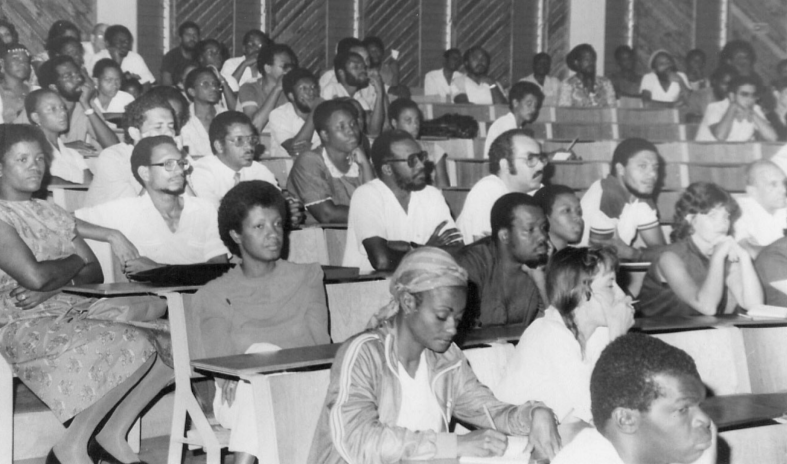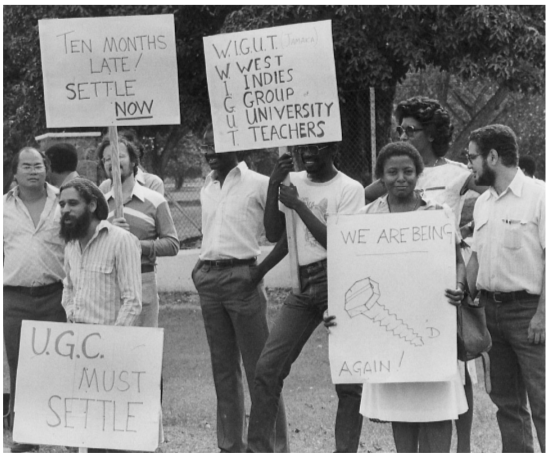About

The Origin
Forming an Association of University Teachers at The University of the West Indies was first raised by Dr. R.B. Davidson, who, before taking up an appointment here, had asked the British Association of University Teachers (AUT) to put him in contact with the Local Association of University Teachers. On discovering that there was none, Dr. Davidson, after his arrival at Mona in 1958, tried to interest others who were already corresponding members of the AUT to form a local association. The first recorded result of this effort was a meeting on 7 May 1958 at Dr. Davidson’s house at which he and three others decided to call a meeting of persons interested in forming an Association of University Teachers at Mona
First General Meeting
The meeting, held on 30 May 1958, was attended by twenty-five persons, twenty of whom were corresponding members of AUT; of these, only F.R. (Roy) Augier, remains on staff today and is still a member.* That meeting revealed that the AUT in England did not permit branches overseas. A Steering Committee under the chairmanship of Sidney Martin was set up to plan a General Meeting to establish the local association. It was this meeting, on 24 October 1958, that can be recognized as the official start of the West Indies Group of University Teachers, since it was at this meeting that the name was approved and a resolution passed setting up an Executive Committee with Sidney Martin elected Chairman and R.B. Davidson Secretary/Treasurer. Twenty-one persons attended this founding meeting, which was held at the Senior Common Room (SCR) – the bar was opened for an additional hour to facilitate the gathering. The Executive was empowered with the arrangement of meetings of general interest to members of the group and specifically the consideration of the possibility of forming a permanent organization in the University College of the West Indies (UCWI). The name, therefore, derives from the group being one of the corresponding members of the British AUT (referred to as “the parent body”), of whom forty-six were on staff at the time. One of the first decisions of that meeting was that meetings to discuss a general topic should be opened to all members of the Academic staff, but that all business meetings should be confined to members only – a policy still in force.
Democratic Threat to Official Structures ?
An insight into the climate on the Campus at that time can be had from the fact that there was debate as to whether the Senate was not already a representative body, thereby removing the need for collective representation. In addition, there was the subsequent disputation concerning the propriety of discussing at a General Meeting an unpublished “Cato Report” on the future of the UCWI then accessible to all staff under confidential cover (which the Executive agreed not to discuss unless published). Indeed, in 1959 the Principal Designate, Arthur Lewis, was expressing concern “lest the WIGUT might appear to be attempting to build up a competing agency in relation to the Senate and its Committees and/or the SCR”. He was assured by the Executive that no such intention existed. The conflict, basically over the democratic structuring of the University with full participation in decision-making, remains with us today.
Early Growth
The group started off restricted to academic staff, although within months the question of membership being extended to Administrative and Library staff was pursued and successfully settled. The membership fee was 6 pence in 1958, but within the year this proved inadequate and was increased to 10 shillings per annum (talk about inflation!). It moved again to £1, then J$6, J$24 and then J$48. In 1964, the first newsletter was published. Early meetings addressed matters of concessions from commercial enterprises, a Federated Superannuation Scheme for Universities (FSSU), study leave and health services, as well as the Cato Report on the future of the UCWI. By 1960, the cost of living in Jamaica compared with Trinidad was becoming a concern of the group (and still is today). This moved the group into submitting memoranda on salaries, a subsequently recurring role of the WIGUT. Interestingly, a motion in 1960, seconded by then Dr. Roy Augier, that no salary change should take place without WIGUT submissions, was defeated by the General Meeting, as was a milder attempt to achieve effective bargaining status. The membership preferred to accept management action meekly.
WIGUT and Other Campuses
Relations with the Imperial College of Tropical Agriculture’s (ICTA) Senior Staff Association were established within the first year of the group’s existence, and after discussions, it was agreed that the ICTA (the forerunner of the St Augustine campus) and Mona should retain separate associations while maintaining close contact. This separate development remains today with the addition of WIGUT (Cave Hill). Each of the new campus groups uses the same name differentiated only by the campus name.
WIGUT in the 1960s
At Mona, the November 1963 Annual General Meeting adopted a new Constitution, which severed the formal link with the British AUT but retained the name WIGUT “because of its familiarity”. Concerns of the group in the 1960s remained largely conditions of service and academic questions, including the restructuring of the University when it ceased affiliating with the University of London. Academic freedom was also an issue in the 1960s. Notably, in 1968 the Jamaican government’s ban on Walter Rodney led to action in defence of academic freedom by WIGUT. This in itself was a great improvement over a 1961 decision not to concern itself with the problem of a Jamaican member who was refused a passport.
WIGUT Becomes a Trade Union
It was not until 1972 that a major change took place in the structure of WIGUT, when the Union, under the leadership and persistence of Dr. Leighton Henry, was converted to a Trade Union and became a properly registered Trade Union as WIGUT (Jamaica) under Jamaican law, on 25 January 1972. The next struggle was for recognition of the Union as the sole bargaining agent for the categories it represented. This was carried out over several months (1972–1973), despite the efforts of the management to avoid recognition by various tactics (for example, special reports to the University Council, unilateral attempts to poll the members’ wishes, and so on). There was even an attempt to form a counter-group – a Staff Association that would not be a Trade Union – but this fizzled out after two meetings. Interestingly, the leading figure in this move was the third Chairman of WIGUT (1963), D.A. Hoyte, and many of his small band of supporters had themselves been prominent “old-stagers” in the early group. This group found it difficult to reconcile themselves to being members of a trade union and remained non-members of WIGUT. When Management realized that none of these evasions were working and that the Union held majority representation of staff, it finally conceded sole bargaining rights on 16 July 1973, not only to WIGUT (Mona) but to each of the other two WIGUTs.
Salary Struggles and Strikes
Recognition struggles were taking place at the same time that a salary review was due, hence the heightened fears of and delays by University Management. With recognition came our first proper salary claim on Management and negotiations, again after much struggle, with the Cato Salaries Committee in 1973. October 1973 saw the first strike action by the Union in the first and third weeks of the month, in attempts to force this negotiation.
The second salary claim was submitted for the 1975–78 period, and again saw strike action, this time a prolonged seventeen-day strike in October 1975, leading to the shut-down of the Campus with support by the student body and other campus groups in attempts to hasten the end of the clumsy negotiation process.

Democratization Moves
Our next significant struggle was for the democratization of the University to put an end to the hegemony of a narrow group of administrators. This issue simmered through the 1970s and gave rise to the whole process of restructuring of the University. Unfortunately, the efforts of the Union, strenuous though they have been, have proved insufficient to bring about the broadening of decision-making. The structures implemented in October 1984 largely maintain the narrow deciding bodies and allow for greater single-government interference by way of financing and administration. It is a structure that will continue to create discontent.
WIGUT into the 1980s
The Union continued to negotiate for its members in the 1978–81 and 1981–84 triennium. In both cases, negotiations were completed well over a year after they began, reflecting the clumsiness and delaying tactics of the University Grants Committee negotiating process. However, several gains were registered, including a house loan scheme, transportation allowance and increases to research funding of the University. We also made full use of our Grievance Procedure Agreement with Management. The Union developed, over this period, close and friendly relations with other campus groups via their elected bodies. We also expanded our social activities, often in collaboration with the SCR, including some successful fêtes, although we were still deficient in sports activities. We had sought to maintain professional development by hosting talks and discussions on a range of academic topics.
Organizationally, the Union consolidated itself with an active seventeen-member Executive, a Journal and a significant membership of between 80 and 85 per cent of the bargaining unit, which was extended in 1983/84 to members of the Norman Manley Law School and the Bahamas-based lecturers in the Centre for Tourism and Hotel Management. The three most important areas for our activities in the 1980s were to:
- Struggle against the crushing economic pressures that eroded our living standards faster than we could negotiate.
- Struggle to preserve the academic integrity of the Campus under the restructured University.
- Find ways of involving more members in the activities of the Union to strengthen our capacity for struggle and for delivering the services our members needed.
Some may argue that these areas are still significantly relevant today.
*Although updated, the basic text for this information was prepared for the 50th Anniversary of WIGUT in 2008. Professor Roy Augier has since retired.
The 1990s
By 1990, in part as a result of the constant devaluation of the Jamaican dollar and limits placed on Public Sector salary increases by the International Monetary Fund (IMF) agreements, the salaries at Mona were no more than half what they were at Cave Hill. Staff members were finding it difficult to make ends meet. Many had left and many more were planning to leave.
The claim put forward by the Union for the 1990–93 triennium was no different from that proposed in previous claims. Members of the bargaining unit should receive internationally competitive salaries. As a first step, there should be parity with the lead UWI campus. In 1990, this lead campus was Cave Hill.
Negotiations started but the issues of parity and international competitiveness were not addressed. An Emergency General Meeting was held at the Senior Common Room. It was agreed that the Union would call a series of one-day rolling strikes. These strikes would occur one day a week throughout the semester, but on a different day each week so as not to consistently disrupt the same classes each time. It was a student-friendly decision which, even though not designed specifically to achieve this, made it easy for the Guild of Undergraduates, as it was then, to offer support.
The overall agreement that came out of the process was extremely favourable to WIGUT Jamaica, and included unrecognized features that significantly cushioned us against the massive erosion in our position which has taken place since. However, the report on the issue of internationally competitive salaries for the WIGUT category for the whole of the UWI (which came to be known as the Lalor Report) was rejected by the University Grants Committee and never implemented.



